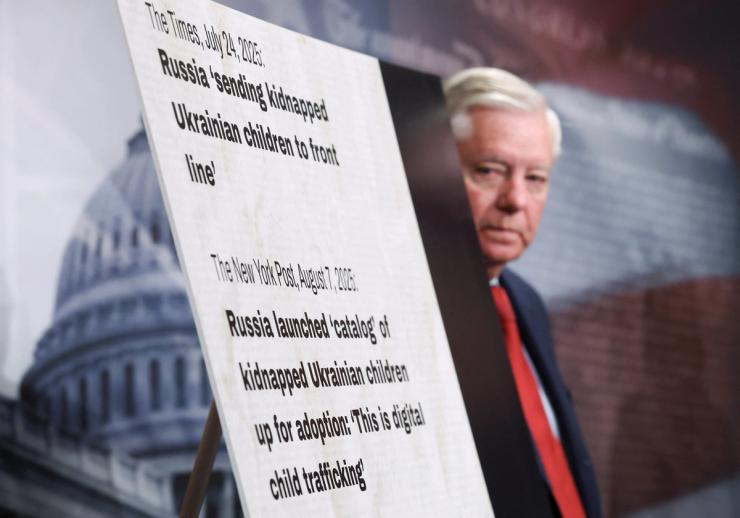The News
A dizzying weekend of bipartisan confusion about a White House push to end Russia’s war with Ukraine is hardening interest among Republicans and Democrats alike in passing crippling secondary sanctions on Vladimir Putin.
“I strongly support imposing tough, targeted sanctions on Russia to weaken Putin’s war machine and strengthen America’s hand at the negotiating table,” said Senate Banking Committee Chair Tim Scott, R-S.C., this weekend. He expressed a desire to put “pressure on the Kremlin and give President Trump maximum leverage to secure peace.”
Congress has little role in the high-stakes talks in Geneva between US, Ukrainian, and European negotiators. Those could produce a handshake by Thanksgiving, as President Donald Trump hopes – or sink back into the morass of a war that’s approaching its fourth year. Sanctions advocates have pressed Trump to support harsher penalties on Russia since April.
Lawmakers’ ability to clarify their course of action on Russia remains muddled by multiple factors, including whether Trump will support a move aimed at raising pressure on the Russian president. An equal but secondary concern when it comes to teeing up a sanctions vote: Whether and when the Senate is willing to grind through the objections of Sen. Rand Paul, R-Ky.
And there’s an ongoing debate between the House and Senate on which chamber should move first.
But after a weekend of mixed messages about a plan that reportedly grew out of secret talks between the US and Russia, senators may return in December ready to finalize the secondary sanctions on Russia’s trading partners.
Sen. Lindsey Graham’s, R-S.C., bipartisan sanctions legislation has support from 85 senators, and he’s repeatedly said he thinks Trump supports it and is ready to sign it. Even so, some other Republicans say that until Senate Majority Leader John Thune, R-S.D., puts the bill on the floor, they remain skeptical.
Paul is continuing to mount a formidable campaign to slow it down, calling it “one of the most ill-conceived bills put forward in Congress.”
“A 500 percent tariff on anybody who does business with Russia would include about thirty-some odd countries,” Paul told reporters this month. “It’s a really poorly written bill. A 500 percent tariff is essentially an embargo. And embargos lead to war.”
It would take a week or so to pass the sanctions bill without consent from all 100 senators to move quickly. Paul said he would “absolutely” object to speeding it through the chamber.
That matters because the Senate has a health care vote to take in December and spending bills to pass by the end of January, a pile-up that puts floor time at a premium.
And at the moment, senators in both parties are in a state of confusion about the origins of the administration-backed plan to end the war.
Know More
Sens. Mike Rounds, R-S.D., and Angus King, I-Maine, raised an alarm on Saturday by saying that Secretary of State Marco Rubio distanced the US from the leaked plan in private conversations over the weekend. The plan has been roundly criticized by Ukraine allies because it highly favors Russian interests.
Rounds, however, issued a statement trying to clarify things after the State Department denied claims that the plan was authored by Russia: “I appreciate Secretary Rubio briefing us earlier today on their efforts to bring about peace by relying on input from both Russia and Ukraine to arrive at a final deal.”
But for some lawmakers, the damage was already done.
Sen. Mark Warner, D-Va., said on ABC on Sunday that the offer from Russia is “awful” and compared it to attempts to appease Adolf Hitler. Rep. Mike McCaul, R-Texas, said on ABC he would “not advise” Ukraine to sign the peace plan without more ironclad security guarantees.
The View From europe
While the administration insisted that the 28-point plan leaked to the press last week was written with buy-in from the Ukrainians, it nevertheless caught much of Europe off-guard.
On Sunday, European officials scrambled to buy Ukraine more time as they met with Rubio, US special envoy Steve Witkoff, and Ukrainian officials in Geneva to discuss the path to ending the war.
European officials see the US-brokered plan as too skewed towards Russia: It contains provisions that would see Ukraine cede territory that Moscow doesn’t currently occupy, reduce the size of Ukraine’s military, and rule out Ukraine joining NATO. European officials offered a counterproposal to the plan on Sunday, Reuters reported.
The View From the white house
The Trump administration defended the plan as it came under intense scrutiny over the past few days. A US official described the proposal as “balanced,” pointing out that it contains security guarantees for Ukraine.
“Both sides aren’t going to get everything that they want,” the official told Semafor. “That’s not what negotiation is.”
Trump is also sending mixed messages on the timeline, as the administration looks to increase pressure on Ukraine to agree to the proposal. Trump and administration officials signaled last week they wanted Kyiv to accept the proposal by the Thanksgiving holiday, only for Trump to say later that it wasn’t his “final offer.”
The US privately threatened to cut off Ukraine from weapons and intelligence if it did not agree to the proposal, Reuters reported; a European official confirmed the report to Semafor.
Notable
- Axios first got wind of the plan this month.

